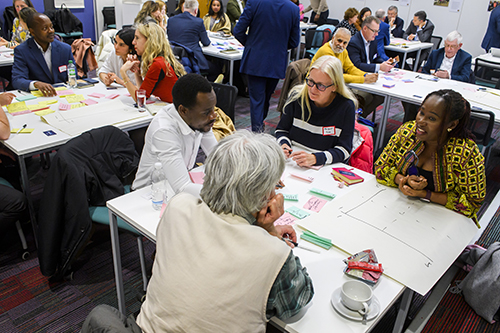Innovating for Impact: How to build thriving startup ecosystems at home and abroad
Building businesses and developing products to solve the problems of the world was at the heart of this year’s Innovating for Impact event hosted by Bayes Business School. Formerly known as Bayes Innovate, the annual event was hosted by the Centre for Creativity in Professional Practice and CityVentures – City St George’s, University of London’s startup support hub.

More than 100 delegates, including investors, venture capitalists, aspiring entrepreneurs and students, explored how socioeconomic, global and financial divides in the distribution of startup funding could be successfully overcome. Among the guests were representatives of the Ghanaian High Commission, the Science Fund of Kazakhstan, and the Foreign, Commonwealth and Development Office. Speakers included EDI leads from educational institutions and figureheads from the Royal Academy of Engineering and the British Council.
Kelly Bewers, a creative strategist who has been working with CityVentures for the last year, led one of the streams, around bridging socio-economic divides.
“A huge 75 per cent of startup founders come from advantaged socioeconomic backgrounds,” she said.
“We need to explore perceptions and cultural narratives around entrepreneurship, and how we can paint different pictures that might better represent people and communities from lower socio-economic backgrounds.”

At the same time, Neil Marshall, Development Director at ChangeSchool, hosted a stream examining how global differences in funding levels could be addressed. The session examined what countries and regions can do to enable effective innovation with higher education at their core. The stream presented projects from Ghana, Kenya, Nigeria and South Africa, that were part of the Innovation for African Universities programme led by Bayes and the British Council.
In the third stream, Marwa Ebrahim, Investment Analyst at Haatch, delivered a talk outlining common reasons why venture capitalists say “no” – ranging from a lack of trust to being deemed too early for execution. She was then joined by Sam Steele, Entrepreneur in Residence at CityVentures, and Iouri Prokhorov, Founder of Supo, for a fireside chat to explore from the perspective of a funding applicant. The stream was concluded with a presentation from Stewart Noakes, Founder of the Canopy Community, and pitch deck clinic where entrepreneurs were able to use AI to benchmark their pitches against successful funding competitors.

Following simultaneous streams, a panel discussion hosted by Philip Salter, Founder of The Entrepreneur’s Network, examined useful practices for widening participation in applying for startup funding and providing equal opportunities, and explored what universities can do to further this.
Philip was joined by Kelly Bewers, Stewart Noakes and Dr Paul Igwe, Associate Professor of Entrepreneurship & Innovation at the University of Lincoln.

After the panel discussion, CityVentures held a Demo Night where entrepreneurs from five startups were each given five minutes to take the stage and showcase innovative business propositions. The pitches drew lively interaction with audience members, many of whom were potential investors.
The event as a whole provided an opportunity to launch Developing University Entrepreneurial Ecosystems in Sub-Saharan Africa, a new book based on the Innovation for African Universities programme, and showcase the Museum of Entrepreneurship.

Dr Sara Jones, Director of the Centre for Creativity in Professional Practice, and co-organiser of the event, said the discussion provided valuable lessons for investors, venture capitalists and institutions, while also celebrating entrepreneurial culture in London and across the world.
“While creative flair and vision are the lifeblood of innovation, funding turns entrepreneurial ideas into reality,” she said.
“However, clear inequalities exist in the accessibility and distribution of financial investment. This means that opportunities to successfully scale an idea into a business differ greatly across global regions and socioeconomic groups – creating ever-widening gaps.
“The Centre for Creativity in Professional Practice aims to build a global community of creative thinkers and practitioners to inspire positive change.
“Our inspiration for this year’s event was twofold. Firstly, to showcase the potential of entrepreneurship and innovation as vehicles for enabling social mobility both at home and abroad, and secondly to demonstrate how AI can be harnessed in the development of new ideas for innovation and entrepreneurship in a business context.
“It was wonderful to hear such wide ranging conversations about creating a level playing field and widening opportunities for funding. Huge thanks to everybody who led streams, spoke, and attended this event.”
Read more about The Centre for Creativity in Professional Practice at Bayes Business School.
Read about the MSc in Innovation Creativity and Leadership and MSc in Entrepreneurship programmes at Bayes Business School.
Featured Bayes Experts
-
Reader in Creative Interactive System Design




